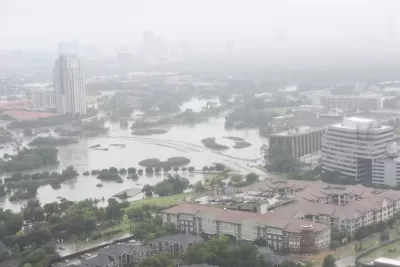Wishing Houstonians continued strength, fortitude, and safe passage this week, Hazel Borys considers resilience.

"Most of us faraway bystanders are observing Houston’s response to Hurricane Harvey with concern at the devastation as well as encouragement at the stories of compassion. With sympathy to the current human suffering from Harvey, we are wishing Houstonians continued strength, fortitude, and safe passage this week. No amount of comprehensive planning or zoning reform can prepare a city for the sort of flood Houston is currently experiencing. An expected 50” of rain in a few days makes this an event that no place in the world is likely to sustain without massive personal and economic impacts. Perhaps not even the Netherlands, who has led the world in stormwater management for hundreds of years, with protection, prevention, and preparedness."
"This volume is more rainfall in 3 days than annual amounts in very wet regions. The rainiest cities in the U.S. – Mobile, Pensacola, and New Orleans – average 67”, 65” and 64” of rain per year. Portland and Seattle average 36” and 37”. 50” in a few days is highly unusual in hurricane history, and is perhaps a 1,000-year flood. That means that there is a 1 in 1,000 chance of it happening in any given year, and not that we should only expect an event of this magnitude every 1,000 years, an important but counterintuitive distinction. Regardless of what kind of planning Houston would’ve done, preparation for this intensity is a challenge."
"A good deal of brilliance has been shone on how climate change is – and is not – involved in progressively more extreme storm events, like this piece by David Roberts. Clearly, we must both adapt and mitigate climate effects as quickly as we can. It is becoming increasingly clear that adaptation and mitigation isn’t an either/or choice."
Borys shares short interviews with two planning gurus, Ben Brown and Scott Bernstein, and points to a number of resources that may help us with our global commons problem.
FULL STORY: Hurricane Harvey provides a sober reminder that resilience is about mitigation and adaptation

Alabama: Trump Terminates Settlements for Black Communities Harmed By Raw Sewage
Trump deemed the landmark civil rights agreement “illegal DEI and environmental justice policy.”

Planetizen Federal Action Tracker
A weekly monitor of how Trump’s orders and actions are impacting planners and planning in America.

The 120 Year Old Tiny Home Villages That Sheltered San Francisco’s Earthquake Refugees
More than a century ago, San Francisco mobilized to house thousands of residents displaced by the 1906 earthquake. Could their strategy offer a model for the present?

In Both Crashes and Crime, Public Transportation is Far Safer than Driving
Contrary to popular assumptions, public transportation has far lower crash and crime rates than automobile travel. For safer communities, improve and encourage transit travel.

Report: Zoning Reforms Should Complement Nashville’s Ambitious Transit Plan
Without reform, restrictive zoning codes will limit the impact of the city’s planned transit expansion and could exclude some of the residents who depend on transit the most.

Judge Orders Release of Frozen IRA, IIJA Funding
The decision is a victory for environmental groups who charged that freezing funds for critical infrastructure and disaster response programs caused “real and irreparable harm” to communities.
Urban Design for Planners 1: Software Tools
This six-course series explores essential urban design concepts using open source software and equips planners with the tools they need to participate fully in the urban design process.
Planning for Universal Design
Learn the tools for implementing Universal Design in planning regulations.
Clanton & Associates, Inc.
Jessamine County Fiscal Court
Institute for Housing and Urban Development Studies (IHS)
City of Grandview
Harvard GSD Executive Education
Toledo-Lucas County Plan Commissions
Salt Lake City
NYU Wagner Graduate School of Public Service




























